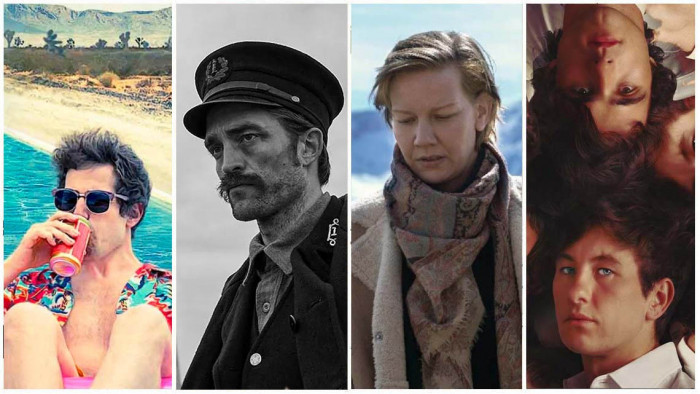As Johnny Depp plays him on screen, here's how Whitey Bulger rose from the city’s housing projects to criminal royalty
To the casual observer it would have looked like a meeting between old friends.
At the picturesque Wollaston Beach, a car was parked looking out over Boston harbour, silhouetted by the skyline of the city behind.
The two men in the front seats were talking in turn, one listening intently to the other, until it was his time to talk. Occasionally, they laughed as they reminisced about the old neighbourhood they were both brought up in and the mutual friends that they shared.
However, this was no cosy reunion: the man in the driver’s seat was Special Agent John Connolly and the man sitting next to him was James ‘Whitey’ Bulger, a career criminal, who would one day run organised crime in the city.
The year was 1975 and Bulger had just agreed to become a Top Echelon Informant for the FBI.
The men’s shared history can be traced back to the predominantly Irish Catholic Old Harbor housing project where both were raised.
The gangster didn’t take long to give his handler an unofficial nickname – ‘Zip’, because the two of them had shared the same south Boston zip code.
“Bulger and the agency danced a little bit in ’74 and there were several meetings and overtures towards him from other agents,” reveals Dick Lehr, a former Boston Globe reporter, who exposed Bulger’s double life and co-authored the book Black Mass about the deal. “But it wasn’t until John Connolly returned to Boston in ’75 and the two men explored their boyhood connections that it hit the comfort factor for Bulger."

Career choices
Bulger was nine years old when he moved to ‘Southie’, and it was his striking platinum blond hair that earned him the nickname that stuck for the rest of his life, bestowed on him by South Boston’s cops who became familiar with him quickly.
“At 13, he was arrested for the first time for school delinquency and larceny,” says Pete Dooley, an ex Boston cop from the Whitey era, who now runs Bulger’s Beantown Bus, a tourist tour of the city’s crime hot spots. “He fell in with a gang called the Shamrocks and over the next three years, he was arrested six more times. Each time the charges escalated and he was becoming increasingly violent with arrests for assault and battery appearing on his record."
He left high school without a diploma and at 17 became a ‘roustabout’, or circus labourer, with the Barnum and Bailey circus. Whitey’s younger brother, Billy, in an interview with the Boston Globe, revealed that his brother “had a more adventuresome spirit than some".
However, the reality of shovelling elephant dung on a daily basis was not his idea of adventure and he was soon back on the streets he loved, hustling enough cash to survive and thrive.
“He became a ‘tailgater’, robbing the tailgates of parked trucks and then selling them at a discount around the neighbourhood,” adds Dooley.
Bulger excelled at tailgating because he was quick-witted, strong and knew exactly what contraband was worth the risk of stealing in the first place. However, his “adventuresome spirit” showed itself again when in 1948, he signed up for the US Air Force. “Violence marred his military career and more assaults landed him in military prison more than once,” comments Dooley.
At 23, after being discharged, he was ready to get back to Southie, but not to tailgating. Whitey wanted bigger returns for the risks he took and he was handed an opportunity by a man named Carl Smith, an experienced bank robber who often recruited on Southie’s streets.
Most of the robberies were two-man jobs that involved Bulger handling the bank’s patrons and employees with the help of a .22 caliber revolver, while Smith relieved the tellers of their cash.
However, after several successful robberies up and down the East Coast, it was Smith who was arrested and duly gave up Bulger among his many accomplices – and on 4 March 1956 Bulger’s bank robbing days were over. Judge George Sweeney sentenced the 27-year-old to 10 years at the Atlanta Federal Penitentiary.
Three years into his stretch, Bulger’s name was linked with a breakout attempt and so prison authorities transferred him to Alcatraz to abort any further ambitions for freedom. While incarcerated in Alcatraz he established his next criminal fraternity, all the time enjoying the knowledge that every day that he spent as a guest of ‘The Rock’ would only add to his tough guy image on the streets back home.

Enhanced reputation
“Spending time in the federal pen, and more specifically Alcatraz, a legendary place among the underworld at the time, enhanced his reputation, no doubt,” reveals TJ English, author of Where The Bodies Were Buried: Whitey Bulger And The World That Made Him.
By the time he was granted parole in 1965, his name was already uttered with caution back in Southie, and when he returned he traded his street gang for the Irish mob and a crew called the Killeens.
“He was by no means the top guy at this stage, but he was feared because he engaged in a shooting war with the Mullen gang when he got home,” says English. “He was a hands-on killer and his time in jail had sharpened his calculating, cold intelligence.”
Even though he ended up on the losing side in the war against the Mullens and feared for his life, his luck still held. The war between the rival crews made the most powerful Irish crime boss in the city, Howie Winter, sit up and take note. He decided that the time was right to consolidate. And so, the remaining Killeen and Mullen men were granted immunity from retribution and took up mid-level roles in the ruling Winter Hill Gang.
The hit list
At the meeting at Wollaston Beach, Connolly raised the issue that if any member of the gang ever found out that he was playing all the angles, his execution would be swift and sure.
But Bulger didn’t worry about being exposed, and he had explained to Connolly that his reputation was so unshakeable that no one would ever believe that it could be true.
“Whitey also used the rumour that he had a relationship with Connolly to burnish his reputation as a guy who had all bases covered,” adds English. “The rumour on the street at the time was that Bulger was paying off Connolly for information, not that he was informing too. This served him very well.”
Within months of the alliance being struck, it came to Connolly’s attention that another Top Echelon Informant had been using Whitey’s name to get some leverage with his FBI handlers. “It’s incredible how quickly after Wollaston Beach that the ‘tip-off murders’, as they’re now known, started to go down,” says Lehr.
First up was Richie Castucci, a mid-level mobster with the New England Mafia. “He was ratting out Whitey, and Connolly fed all the details to him,” explains Lehr. “It’s never been established whether the agent went as far as to say, ‘we need to kill this guy’, but he knew that Whitey only had one solution to problems like Castucci."
Bulger decided to postpone Castucci’s execution until the end of the NFL’s regular season, so that he could maximise his returns by killing the mobster and stealing any profits he had made from his sports betting operations.
“He was always calculating and strategising,” adds Lehr. “Stephen Flemmi, his right-hand man, always said that every one else was playing checkers while Whitey’s playing chess.”
The extent of Connolly’s deceptions to his FBI masters eventually totalled more than 1,000 pages of falsified reports on Bulger’s operations as he systematically began to take out Winter Hill gang members who could potentially threaten him.
Among all the fabricated paperwork is a report on Bulger’s whereabouts generated on 15 November 1975, the day that he decided to get rid of another potential rival, Tommy King, the top enforcer for the old Mullen Gang.
It’s now known exactly where Bulger was that day – he was setting King up to be murdered.
After being told that he was needed as extra muscle on a drive-by-hit, Bulger picked King up and told him he could sit up front with him. He next picked up Flemmi and a Winter Hill hitman named Johnny Martorano, who jumped into the backseat. As they drove around the back streets of Southie looking for their phantom victim, Flemmi handed out guns from a brown paper bag, all of which were loaded except for the one handed to King.

Tip your hat
Martorano then wasted no time in shooting King in the head from the back seat. Bulger didn’t flinch and still driving, reached over and pulled King’s slumped body upright in the seat and placed a Boston Red Sox baseball cap over his gaping head wound.
Martorano was customarily dropped off at his car, so he never found out where the two other men buried the Irish gangster's body.
The hitman has since gone on the record and revealed that a few weeks after the murder, he was driving along the Southeast Expressway with Bulger. As they drove over a bridge on the Neponset River, Bulger looked over at him and said: “Tip your hat to Tommy.”
And that was indeed where King’s body was found, 25 years later in 2000, when it was unearthed in a shallow grave alongside other Bulger victims from the era.
Mutual benefits
However, Bulger’s swift ascension to the top job wasn’t predicated on violence and murder, it was entirely down to the fast-talking nature of John Connolly.
“Connolly is a really charming guy,” Lehr explains. “If he had chosen a different profession, like politics or public relations, he would have excelled. He’s very proactive and good on his feet."
He needed those skills when he learned that Howie Winter and the upper tier of the Winter Hill Gang were about to go down thanks to a federal investigation into a race-fixing scheme that was happening at racetracks up and down the East Coast.
“Winter and several other top guys got indicted and went away to jail,” adds Lehr. “Connolly went to work to convince the prosecutors to leave Whitey out of the indictments because he was a valuable asset. And from that moment on, Whitey was the boss.”
And so Whitey Bulger walked into the Triple O’s Lounge, the gang’s HQ, uncontested as the boss of the Irish Mafia in Boston. Lehr remembers going to the bar on assignment for the Boston Globe during this time. “The Triple O’s, complete with shamrock, might have been the sign over the door, but locally it was known as The Bucket Of Blood. It was an intense, smoke-filled local bar. I went in there and suddenly all eyes were on me. They just assumed I was a cop, because who else would be stupid enough to go in there?"
It was probably the closest Lehr ever came to meeting the man, but somewhere in the back sat Whitey Bulger whose crimes would continue to fill so many column inches in his paper.
Even the New England Mafia would fall because of the handshake between Connolly and Bulger that night at Wollaston Beach, leaving Whitey to rule Boston’s underworld for decades to come.
Checkers and chess.
Black Mass is at cinemas nationwide from 27 November; the book Black Mass: Whitey Bulger, The FBI And A Devil’s Deal by Dick Lehr is re-released on 25 November
Latest
Related Reviews and Shortlists


The 10 best war movies of the 21st century









